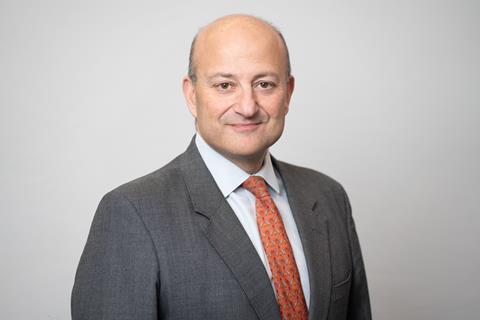When he introduced the Mansion House Compact in July 2023, the UK’s chancellor of the exchequer tasked the British Business Bank with establishing an investment vehicle, opening its commercial capability and investment pipeline to pension investment. British Business Bank CEO Louis Taylor spoke to IPE about designing such a vehicle and its potential catalytic impact
In his July 2023 Mansion House speech, the chancellor of the exchequer, Jeremy Hunt, asked the British Business Bank to explore establishing a vehicle that could receive third-party capital in the form of pension fund investment, making use of the Bank’s track record and market access to a range of promising high-growth companies.
Louis Taylor, the bank’s CEO, said the bank has been tasked with a variety of objectives all around helping small businesses get access to finance; one of those objectives was to secure more UK institutional money into venture capital and growth equity to support such companies.
He said: “That is for not only the reasons of generating economic growth, which have a strong political aspect to [them], but also to help members of pension funds to generate better returns on their portfolios because growth companies can yield good returns.”
But Taylor highlighted that over the past 20 years, there has been a retreat of institutional money away from UK equity, both public and private.
“When the chancellor was thinking about how he wanted to respond to those issues we got involved because we hope that we are the obvious vehicle to be able to have a catalytic impact on the market,” he said.
Taylor stressed that the bank’s involvement is not meant to be long-term.
“We want to have a catalytic impact on the market,” he said, adding that the chancellor is looking for the bank to create a vehicle to allow UK institutional asset owners, particularly defined contribution (DC) pension schemes, to “invest in a part of the market that they find difficult to invest in”.
By 2030, the chancellor wants DC pension schemes to invest at least 5% of their default funds into private equity to support UK growth.
Taylor believes there is capacity for UK institutional money to invest in the market without spiking valuations and depressing returns.
“At the moment, we’re investing around £600m ourselves in funds every year, [in] equity and debt. I think that the market could bear pretty much double that without spiking valuations,” he said.

Taylor hopes that by the time the British Business Bank steps away, pension funds will be “very successful not only in investing in lots of companies and getting pensioners investing in these companies, but also demonstrating this part of the market is attractive to the fund management industry”.
At that point, he said the government can step back and the British Business Bank can “either run the fund down or sell it”.
The journey so far
Taylor disclosed that since the bank was tasked with establishing the vehicle, it talked to “well over 20 pension funds representing over £450bn in assets”.
He said that the message coming from the conversation so far is that pension schemes are interested in this part of the market “but they have struggled” to find a way that is economically viable.
“There is no lack of interest in a sensible allocation to this market. It’s not about huge allocations, but sensible, appropriate value allocations as part of a diversified portfolio.”
He added that another issue for pension funds investing more in private equity is the amount of due diligence to find the right vehicles to invest in and the ability to “write big cheques where you find venture capital opportunity individually”.
The British Business Bank has investments with over 70 venture capital and growth equity funds giving exposure to more than 1,200 companies, over half of which are in the UK.
Taylor noted that a lot of these companies are tech and science-led and that they “represent a really good base off which to build a vehicle in which DC pension funds could invest going forward”.
The bank also has a programme called Future Fund: Breakthrough, another initiative it was tasked with during the chancellor’s Autumn Statement, awarding the bank with an additional £50m to invest in later-stage tech and science-led companies.
He said the portfolio was being developed “very nicely” with investment in future and breakthrough programmes. “We’ve got exposure now to over 20 high-growth, high-potential UK-based science and tech-led companies.”
This gives the bank a foundation to build the new vehicle, Taylor said. The bank is currently looking at which of its programmes should be included in the vehicle thesis for the growth fund.
He said: “We are setting an allocation and putting structures in place to ensure that this is a segregated entity that takes decisions independently of government and has a fiduciary duty to investors in terms of generating returns.”
Taylor added that there are also some functions the bank needs to create that do not exist at the moment. For example, this will be the first time the bank is managing proper third-party money so it will need an investor-relations function.
Furthermore, as it stands now, the vehicle is not regulated, but Taylor hopes “it will be shortly”.
He stressed that it will all take time as the British Business Bank has to be “as commercial as anybody else in the market”, but he expects that the vehicle will be up and running in no more than 18 months.
Mansion House Compact explained
The Mansion House Compact is a commitment announced by the UK chancellor Jeremy Hunt in his keynote policy speech at the Mansion House, the official residence of the Lord Mayor of London, on 10 July 2023.
It calls on DC pension schemes to boost investment in UK unlisted equities.
As part of the compact, signatories are expected to allocate at least 5% of their default funds to unlisted equities by 2030.
Currently, the DC schemes’ investment in UK unlisted equities is under 1%.
According to the chancellor, if the UK’s DC market follows suit, this could unlock up to £50bn of investment into high-growth companies by that time.
The initial signatories of the compact included Aviva, Scottish Widows, Legal & General, Aegon, Phoenix, NEST, Smart Pension, M&G and Mercer. Since then, Aon and Cushon have joined as signatories of the compact.
Read the digital edition of IPE’s latest magazine























